
How online platforms helped male make-up YouTubers to boost up their popularity
In this article I will focus on the world of male make-up YouTubers. These vloggers have been using YouTube and other platforms to make their voices heard. How did they do that?
With the rise of the Internet and Web 2.0 ideals, Social Networking Sites and User Generated Content Sites have been helping people all over the world gain popularity and become micro-celebrities. Micro-celebrities are social media celebrities who have many followers, usually in one specific niche , who are popular on social media and later become popular in the offline world as well. These online platforms are an important factor as they allow them to gain success and popularity and reach worldwide audiences. Male make-up YouTubers are quite a controversial group because they break down the societal conception that make-up is a female thing. They try to promote equality and diversity. Internet is a good place for letting your voice be heard, as is evident from the fact that such a controversial group gained acceptance by posting online videos that had the effect that more and more people like them and consider them real artists.
Jeffree Star - a male make-up guru example
An example of a popular and viral male make-up YouTuber is Jeffree Star, an American male make-up artist who started his "career" on YouTube by making make-up tutorials. Career is here used in a very specific way, it "refers to the sequence of movements from one position to another in a system" (Becker, 1963, p 24). Carreer is thus not limited to a job, but can also be used to understand how somebody can become a master within a certain social group.
Star started his career as a musician on MySpace with over 25 million plays of his music. In addition, he has been spreading his content for more than a decade through Social Media platforms such as Facebook and Instagram, which led to an increasing number of fans. He became more and more famous and eventually started his own make-up brand with the help of the notorious Kat von D. Jeffree Star can be seen as a master in the sense of the word Howard Becker intended. He is becoming a role model, somebody who not only knows what is cool but also has the power to determine what is cool and what is not. He is helping out and teaching "novices" in this branch how to be successful and how to be authentic in a controversial group that has to deal with a considerable amount of discrimination.
By analyzing his Social Media presence we can find out more about what he beliefs to be the way to become authentic, successful and popular. He co-constructs the norms that are shared by this group. These norms are mostly about make-up trends and how-to's, but the shared underlying belief is that males can use make-up too and express themselves as they please. In a recent Facebook video Jeffree Star promotes the no-eyebrow trend, saying that he doesn't need eyebrows and that therefore it shouldn't be considered the "normal" thing anymore.
Make-up is genderless
Another aspect that male make-up YouTubers share is pro-diversity activism. This too can be seen in our example as Jeffree posted on his YouTube channel a video where he speaks openly about racism and discrimination, that it should be dealt with and that he deeply hates it, even though in his past he was accused of racist slurs. He claims that he has changed and that not being accepted in society made him hateful back then.
Jeffree Star became famous only through the online environment. By posting videos all the time, and by being a guy who uses make-up, he gained a lot of attention. Nowadays, Jeffree Star has a make-up brand of his own and has appeared on American television. These are the stages that moved up his career as a male make-up YouTuber to the highest scale. As Jeffree Star says in his videos: "I am a hot topic, I have always been outspoken, I am, you know, someone who looks different". With this statement he clearly shows support towards freedom of expression. Specifically, male make-up YouTubers are pro LGBTQ and they demolish social gender roles.
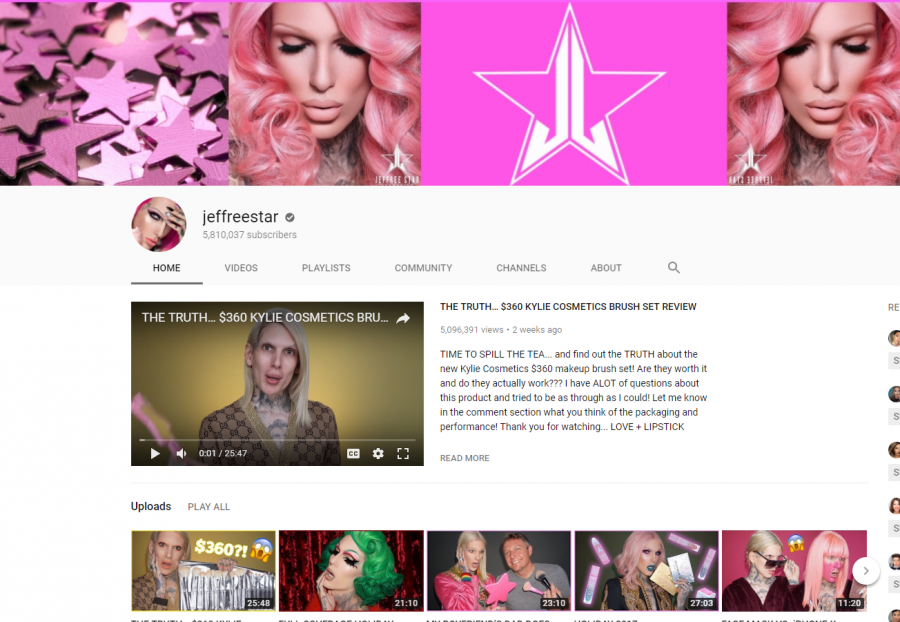
Jeffree Star's YouTube Channel
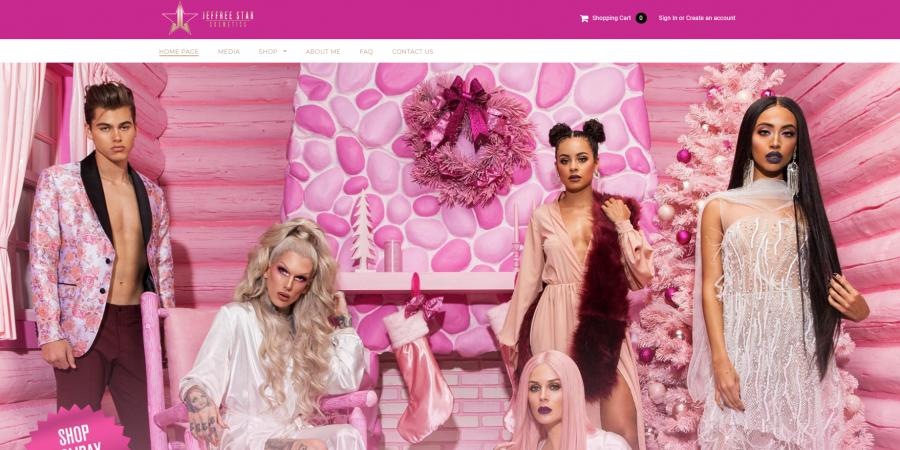 © Jeffree Star
© Jeffree StarJeffree Star's Webshop for Make-Up

Jeffree Star's Webshop for Make-Up
Online media as an infrastructure for micro-celebrities
As mentioned above, online media platforms are the main factor that contributed to the success of male make-up YouTubers. This was possible due to the User Interface that these online media provide: people can subscribe, like and comment on videos, and this has resulted in a so-called "like economy" where the quantity of likes and followers shows the value of a person. Nowadays, micro-celebrities can be easily created via Social Networking Sites such as Instagram or Facebook. Our example Jeffree Star can be considered a micro-celebrity as well because he earns his income through his social media sites and attracts sponsors for who he advertises. In addition, male make-up YouTubers support each other on online platforms by re-posting each other's content or for instance filming collabs. Jeffree Star made a YouTube video with another male make-up vlogger named MannyMUA.
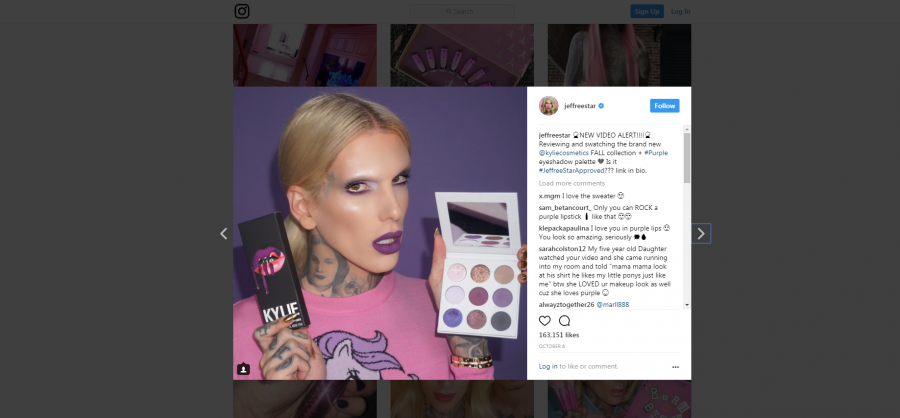
Jeffree Star advertising for Kylie cosmetics
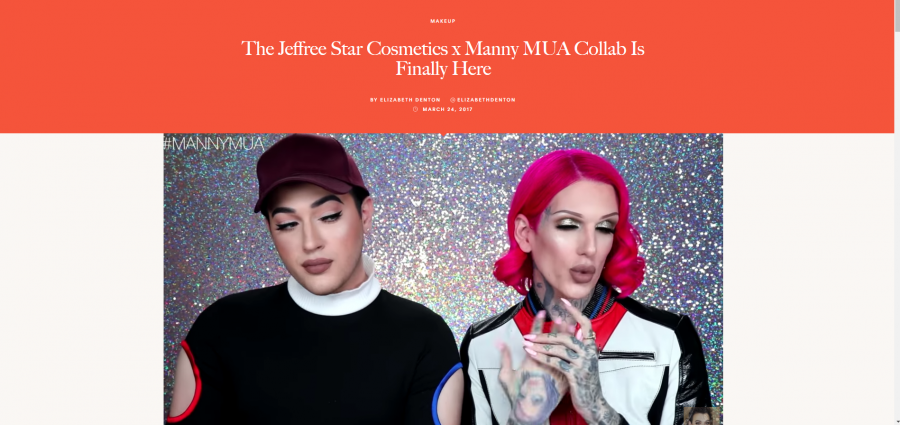 © allure.com
© allure.comCollab Jeffree Star and Manny MUA

Collab Jeffree Star and Manny MUA
Besides being a place suited to freedom of expression and gaining popularity, social media are also facilitating an enormous diversification of what is considered normal. The fact that people can become micro-celebrities and construct a following in a very specific niche, reconstructs the concept of mainstream culture. Mainstream culture is now 'niched', everyone is now an outsider. The Internet, one could say, is a place where "deviants" or "outsiders" as Howard Becker calls them, have a place to gather, to talk and to share their emotions and lifestyles with other people who feel the same way as they do. The internet functions as an alternative space for those who are being marginalized by the mass media or by 'mainstream society'. According to Howard Becker, these outsiders or 'members of such niched cultures' "talk different, they act different, they look different, they’re just not like other people, that’s all…" (Becker, 1963, 89).
The emphasis on "different" is also reflected in Jeffree Star's quote that I mentioned above in which he says that he is someone "who looks different". There has always been controversy around transgenders, homosexuals, and drag queens. Such 'deviance from the mainstream norms' is finally getting more and more accepted into society. Social media platforms, and the fact that people can use them to air their culture, and make stronger connections worldwide, has contributed to the mainstreaming of this niched culture.
But the Internet has a dark side too, as it makes these people prone to criticism, hate speech and homophobic slurs. Interestingly, the fandom community around these vloggers seems to have helped them getting through this. For instance, Jeffree Star made several collabs with Manny MUA in a compilation of videos called "Reading mean hate comments" where they read hate comments they receive on their YouTube channels to make fun of it and counter the hatred. This is seen by their fans as a really strong attitude towards homophobia and they became an example to follow for other male beauty vloggers.
The fandom around male make-up YouTubers
The fandom of male make-up YouTubers mostly exists online. One could think that a male make-up YouTuber like Jeffree Star will be liked only in the LGBTQ community or by guys who like make-up but in fact, the reality turns out to be different. Jeffree Star is considered a make-up icon by a lot of female fans and he actually is appealing to all make-up lovers no matter what their gender is. With the aid of the Internet, online fan clubs emerged, which has lead to a new world of opportunities for fans to talk about their male make-up idols and to share content. Internet has made it so easy for fan clubs: people do not have to travel to fan meetings anymore and fan clubs can be extended worldwide because communication on the Internet is borderless. For example, Jeffree Star's YouTube channel has almost 6 million subscribers from all over the world and the fandom is pretty diverse.
The online activity of a male make-up vlogger is taking place on platforms such as YouTube, Facebook, Instagram and Twitter, but the online activity of the fans takes place not only on these platforms where they dedicate special pages to their idols, but also on forums and discussion websites like Reddit. Reddit is well-known for its accessibility, it is easy to use and it facilitates communication between lots of people, similar to a forum. Discussions about Jeffree Star can be found on Reddit under the "BeautyGuruChatter" section (subreddit). Reddit users who are Jeffree Star fans usually create posts when something new happens concerning their idol, presenting it as news. In this way, fans stay connected to the newest content about their idols and keep themselves updated on what their idols do. In addition, fans discuss the news with each other and try to guess what their idols' next move will be, or, in this case, anticipate the next make-up trend.
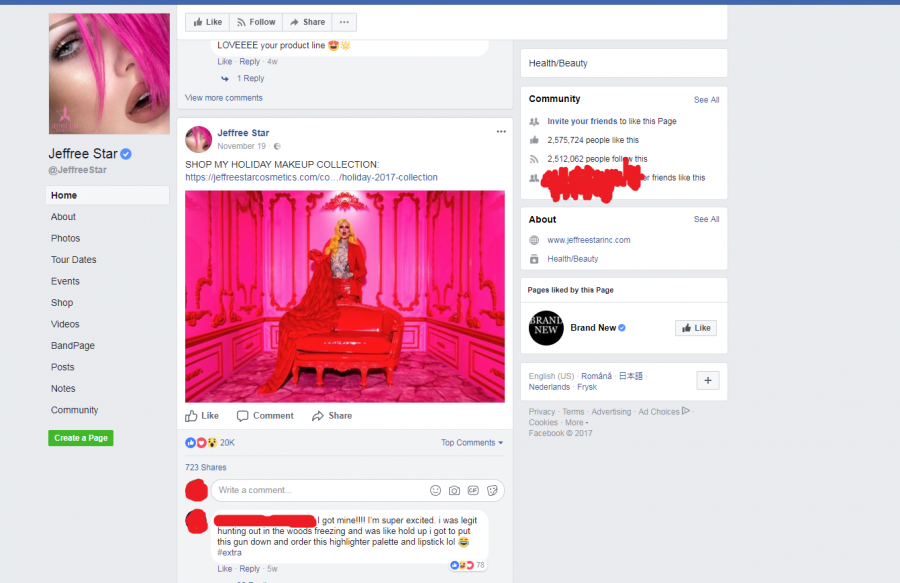
Facebook comments on Jeffree Star's page
How are YouTube communities and fandoms formed?
YouTube policy allows YouTube users to have their own channel, to create a profile, to make playlists, to post comments and to like or dislike other videos. As Keidra Chaney mentions in an online article: "it’s an interesting example of how a social network has evolved into something drastically different than its intended use, based on the collective actions of online communities." YouTube is not only a User Generated Content platform, but it is also a community and fandom builder. (Chaney, 2013). Many channels can be found on YouTube that post content related to certain fandoms. Of course, our example Jeffree Star has a YouTube fandom too. Usually fans post videos about Jeffree Star or they go to make-up conventions and film some clips that they later upload online for the entire fandom to see.
Another statement by Keidra Chaney is that : "Many fans use YouTube to keep fandoms alive, while remaining one step ahead of YouTube’s Copyright Police. " (Chaney, 2013). This quote depicts the reality that die hard fans actually keep posting content about their idols and even re-post content from their idols to make sure that it will never be gone from the Internet but to do this they have to give their best to find the holes in YouTube's copyright policy, by, for example, posting videos without sound or by slightly modifying them to reduce the danger of them being deleted. Videos that belong to male make-up YouTubers can be found on YouTube reposted by random people, but they usually get deleted a short time after.
"YouTube seems like an unlikely location for a multimedia fandom encyclopedia, but it’s probably the only location where such a function is even possible online." - Keidra Chaney
Once again, Keidra Chaney mentions the importance and power of YouTube. YouTube's strength stands in the fact that this platform is a hybrid between a User Generated Content Platform, which it was intended to be, and a Social Networking Site, which it eventually became due to YouTube communities. Male make-up YouTubers need fans in order to survive online and YouTube created the perfect environment for them to express their make-up creativity. "Make-up is genderless" is the new belief that they have sparked in people's hearts through the Internet and with the help of their fellow supporters and fans they spread this belief worldwide.
Conclusion
To sum up, the online universe of male make-up YouTubers is very broad and it definitely doesn't end with YouTube. Male make-up vloggers have spread their content over all Internet platforms such as Facebook, Instagram, Twitter etc. Even so, YouTube has played and continues to play a huge role in their quest for fame. YouTube is one of the most accessed sites and it is the number one video sharing platform out there, which makes it a powerful tool for a group like male make-up vloggers to express their talent and artistic skills and to share it with a large international audience.The example mentioned in this paper, Jeffree Star, is one of these people who gained fame thanks to the online environment. Now we see him being popular offline as well, therefore, the online world plays a huge role in the development of one's "career", as Howard Becker would call it. Besides becoming famous through online media and being loved by their fans, male make-up YouTubers have influence on culture as well. They are fighters in the cultural revolution regarding gender roles, fighting for equality, and deconstructing the idea that make-up is only for girls.
References
Becker, H. S. (1963). Outsiders: studies in sociology of deviance. New York, NY: Free Press.
Chaney, K. (2013). How YouTube Keeps Dormant Fandoms Alive. Retrieved January 01, 2018, from http://thelearnedfangirl.com/2013/01/how-youtube-keeps-dormant-fandoms-a...